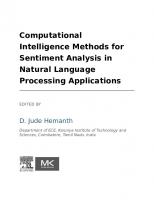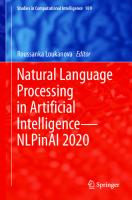Computational Intelligence Methods for Sentiment Analysis in Natural Language Processing Applications 9780443220104, 9780443220098
Sentiment Analysis has become increasingly important in recent years for nearly all online applications. Sentiment Analy
154 111 11MB
English Pages 254 Year 2024
Table of contents :
Cover image
Title page
Table of Contents
Copyright
List of contributors
Preface
1. Role of machine learning in sentiment analysis: trends, challenges, and future directions
Abstract
1.1 Introduction
1.2 Related background
1.3 Performance metrics
1.4 Tools for sentiment analysis
1.5 Trends of sentiment analysis
1.6 Challenges
1.7 Conclusion
1.8 Future direction
References
2. A comparative analysis of machine learning and deep learning techniques for aspect-based sentiment analysis
Abstract
2.1 Introduction
2.2 Steps in sentiment analysis
2.3 Applications of sentiment analysis
2.4 Types of sentiment analysis
2.5 Aspect-based sentiment analysis
2.6 Performance metrics
2.7 Datasets
2.8 Future research challenges
2.9 Conclusion
References
3. A systematic survey on text-based dimensional sentiment analysis: advancements, challenges, and future directions
Abstract
3.1 Introduction
3.2 Literature survey
3.3 Observations drawn from the literature survey
3.4 Open issues and challenges in dimensional sentiment analysis
3.5 Future directions
3.6 Conclusion
References
4. A model of time in natural linguistic reasoning
Abstract
4.1 Introduction
4.2 Human biology of time
4.3 Evidence of timelines in the brain: time in linguistic reasoning
4.4 Some clues and tests
4.5 Conclusions and future work
References
5. Hate speech detection using LSTM and explanation by LIME (local interpretable model-agnostic explanations)
Abstract
5.1 Introduction
5.2 Bag of words
5.3 Term frequency–inverse document frequency
5.4 Glove—word embedding
5.5 Long short-term memory
5.6 LIME—local interpretable model–agnostic explanations
5.7 Code
References
6. Enhanced performance of drug review classification from social networks by improved ADASYN training and Natural Language Processing techniques
Abstract
6.1 Introduction
6.2 Related works
6.3 Proposed model
6.4 Results and discussion
6.5 Conclusion
References
7. Emotion detection from text data using machine learning for human behavior analysis
Abstract
7.1 Introduction
7.2 Available tools and resources
7.3 Methods and materials
7.4 Outlook
7.5 Conclusion
References
8. Optimization of effectual sentiment analysis in film reviews using machine learning techniques
Abstract
8.1 Introduction
8.2 Literature Survey
8.3 Proposed System
8.4 Computational Experiments and Result Analysis
8.5 Conclusion
References
9. Deep learning for double-negative detection in text data for customer feedback analysis on a product
Abstract
9.1 Introduction
9.2 Related work
9.3 Proposed methodology
9.4 Experimental results and discussion
9.5 Conclusion
References
10. Sarcasm detection using deep learning in natural language processing
Abstract
10.1 Introduction
10.2 Datasets
10.3 Overall process of sarcasm detection
10.4 Sarcasm detection and classification
10.5 Sarcasm detection: python code implementation
10.6 Evaluation
10.7 Results and discussion
10.8 Conclusion
References
Further reading
11. Abusive comment detection in Tamil using deep learning
Abstract
11.1 Introduction
11.2 Related work
11.3 Dataset description
11.4 Methodology
11.5 Results
11.6 Conclusion
References
12. Implementation of sentiment analysis in stock market prediction using variants of GARCH models
Abstract
12.1 Introduction
12.2 Literature review
12.3 Methodology
12.4 Sentiment analysis on twitter data
12.5 Forecasting on financial stock data
12.6 Implementation of GARCH models
12.7 Stimulating stock prices
12.8 Conclusion
References
13. A metaheuristic harmony search optimization–based approach for hateful and offensive speech detection in social media
Abstract
13.1 Introduction
13.2 Literature survey
13.3 Methodology
13.4 Experiments and results
13.5 Conclusion
References
Index
Cover image
Title page
Table of Contents
Copyright
List of contributors
Preface
1. Role of machine learning in sentiment analysis: trends, challenges, and future directions
Abstract
1.1 Introduction
1.2 Related background
1.3 Performance metrics
1.4 Tools for sentiment analysis
1.5 Trends of sentiment analysis
1.6 Challenges
1.7 Conclusion
1.8 Future direction
References
2. A comparative analysis of machine learning and deep learning techniques for aspect-based sentiment analysis
Abstract
2.1 Introduction
2.2 Steps in sentiment analysis
2.3 Applications of sentiment analysis
2.4 Types of sentiment analysis
2.5 Aspect-based sentiment analysis
2.6 Performance metrics
2.7 Datasets
2.8 Future research challenges
2.9 Conclusion
References
3. A systematic survey on text-based dimensional sentiment analysis: advancements, challenges, and future directions
Abstract
3.1 Introduction
3.2 Literature survey
3.3 Observations drawn from the literature survey
3.4 Open issues and challenges in dimensional sentiment analysis
3.5 Future directions
3.6 Conclusion
References
4. A model of time in natural linguistic reasoning
Abstract
4.1 Introduction
4.2 Human biology of time
4.3 Evidence of timelines in the brain: time in linguistic reasoning
4.4 Some clues and tests
4.5 Conclusions and future work
References
5. Hate speech detection using LSTM and explanation by LIME (local interpretable model-agnostic explanations)
Abstract
5.1 Introduction
5.2 Bag of words
5.3 Term frequency–inverse document frequency
5.4 Glove—word embedding
5.5 Long short-term memory
5.6 LIME—local interpretable model–agnostic explanations
5.7 Code
References
6. Enhanced performance of drug review classification from social networks by improved ADASYN training and Natural Language Processing techniques
Abstract
6.1 Introduction
6.2 Related works
6.3 Proposed model
6.4 Results and discussion
6.5 Conclusion
References
7. Emotion detection from text data using machine learning for human behavior analysis
Abstract
7.1 Introduction
7.2 Available tools and resources
7.3 Methods and materials
7.4 Outlook
7.5 Conclusion
References
8. Optimization of effectual sentiment analysis in film reviews using machine learning techniques
Abstract
8.1 Introduction
8.2 Literature Survey
8.3 Proposed System
8.4 Computational Experiments and Result Analysis
8.5 Conclusion
References
9. Deep learning for double-negative detection in text data for customer feedback analysis on a product
Abstract
9.1 Introduction
9.2 Related work
9.3 Proposed methodology
9.4 Experimental results and discussion
9.5 Conclusion
References
10. Sarcasm detection using deep learning in natural language processing
Abstract
10.1 Introduction
10.2 Datasets
10.3 Overall process of sarcasm detection
10.4 Sarcasm detection and classification
10.5 Sarcasm detection: python code implementation
10.6 Evaluation
10.7 Results and discussion
10.8 Conclusion
References
Further reading
11. Abusive comment detection in Tamil using deep learning
Abstract
11.1 Introduction
11.2 Related work
11.3 Dataset description
11.4 Methodology
11.5 Results
11.6 Conclusion
References
12. Implementation of sentiment analysis in stock market prediction using variants of GARCH models
Abstract
12.1 Introduction
12.2 Literature review
12.3 Methodology
12.4 Sentiment analysis on twitter data
12.5 Forecasting on financial stock data
12.6 Implementation of GARCH models
12.7 Stimulating stock prices
12.8 Conclusion
References
13. A metaheuristic harmony search optimization–based approach for hateful and offensive speech detection in social media
Abstract
13.1 Introduction
13.2 Literature survey
13.3 Methodology
13.4 Experiments and results
13.5 Conclusion
References
Index

- Author / Uploaded
- D. Jude Hemanth
- Similar Topics
- Computers
- Algorithms and Data Structures: Pattern Recognition






![Computational Intelligence Methods for Super-Resolution in Image Processing Applications [1st ed. 2021]
3030679209, 9783030679200](https://ebin.pub/img/200x200/computational-intelligence-methods-for-super-resolution-in-image-processing-applications-1st-ed-2021-3030679209-9783030679200.jpg)

![Natural Language Processing and Computational Linguistics [1st edition]
9781788838535, 178883853X](https://ebin.pub/img/200x200/natural-language-processing-and-computational-linguistics-1st-edition-9781788838535-178883853x.jpg)
